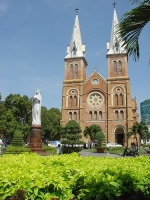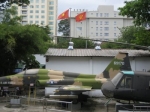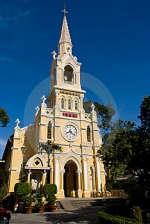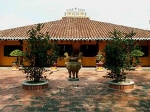|  Ho Chi Minh City is the heart and soul of
Vietnam. It's a bustling, dynamic and industrious centre, the largest city in the country, the economic capital and the cultural trendsetter. Yet within the teeming metropolis are the timeless traditions and beauty of an ancient culture. Ho Chi Minh City is the heart and soul of
Vietnam. It's a bustling, dynamic and industrious centre, the largest city in the country, the economic capital and the cultural trendsetter. Yet within the teeming metropolis are the timeless traditions and beauty of an ancient culture.
This is a city that churns, ferments, bubbles and fumes. The streets, where much of the city's life takes place, are a jumble of street markets, shops, pavement cafes, stands-on-wheels and vendors selling wares spread out on sidewalks. It's impossible not to be infected by its exhilarating vibe.
General information:
Area: 1000 km2
Population: 15 millions
District: numbered from 1 to 12, Tan Binh, Binh
Thanh and Go Vap |
 When to go When to go |
| |
Information on weather in Saigon so plan the best time for your vacation |
 Health and safety Health and safety |
| |
Importance to know about sercurity and decease |
 Getting there and around Getting there and around |
| |
Find how to find your way to and around this city |
 Banks and currency Banks and currency |
| |
Money issue and exchange rates |
 Telephone Telephone |
| |
Instruction on telephone and network available |
 History History |
| |
Brief history of this 300 years old city |
 Things to do Things to do |
| |
Top things to do in Ho Chi Minh city |
 Cu Chi Tunnels Cu Chi Tunnels |
_thumb.jpg) |
Cu Chi Tunnels are located approximately 70km northwest of Ho Chi Minh City centre in Cu Chi Rural District. Characteristic: Cu Chi Tunnels consist of more than 200km of underground tunnels. This main axis system has many branches connecting to underground hideouts, shelters, and entrances to other tunnels. |
 Palace of Unification Palace of Unification |
 |
1968 after completion of conquering ???Six provinces of the South???, the French colonialists built here a palace. At first the palace was the residence of the Governor General of the South. From 1887 (Oct. 17, 1887), when the French President signed the decree to establish the federal of Indochina, the Palace became the French Governor General???s Residency called Norodom???s Palace. |
 Notre Dame Cathedral Ho Chi Minh City Notre Dame Cathedral Ho Chi Minh City |
 |
Notre Dame Cathedral is a huge architectural monument located in the heart of the Ho Chi Minh City. This redbrick structure with its twin towers has been a well-known feature of the nation???s economic capital. |
 Diamond Superbowl Diamond Superbowl |
 |
Bowling in Ho Chi Minh City has attained a definite height in popularity and expansion regarding recreational and enjoyment sources in the city. In the bowling plazas you can also enjoy with different other sources of enjoyment like music and fast food and beverages etc. |
 War Remnants Museum War Remnants Museum |
 |
The War Remnants Museum (Vietnamese: B???o t??ng ch???ng t??ch chi???n tranh) is a war museum at 28 Vo Van Tan, in District 3, Ho Chi Minh City (Saigon), Vietnam. It primarily contains exhibits relating to the American phase of the Vietnam War. |
 Binh Quoi Tourist Village Binh Quoi Tourist Village |
 |
The Binh Quoi Tourist Village (L??ng Du L???ch B??nh Qu???i in Vietnamese) is a tourist attraction in the B??nh Th???nh district of Ho Chi Minh City, in southern Vietnam. |
 Xa Loi Pagoda Xa Loi Pagoda |
 |
The Xa Loi Pagoda (Vietnamese: Ch??a X?? L???i; H??n t???: ?????????) is the largest pagoda in Ho Chi Minh City, Vietnam. It was built in 1956 and was the headquarters of Buddhism in South Vietnam. The pagoda is located at 89 Ba Huyen Thanh Quan Street in District 3, Ho Chi Minh City and lies on a plot of 2500 square metres. The name Xa Loi is the Vietnamese translation for sarira, a term used for relics of Buddhists. The pagoda is most well-known abroad for the Xa Loi Pagoda raids, in which the Army of the Republic of Vietnam Special Forces loyal to Ngo Dinh Nhu, the brother of the Catholic President Ngo Dinh Diem, raided and vandalised the pagodas on August 21, 1963. |
 Cha Tam Church Cha Tam Church |
 |
Built at the beginning of the last century, Cha Tam Church has a pleasing pastel yellow and white paint job and a peculiar statue in the tower |
 Giac Lam Pagoda Giac Lam Pagoda |
 |
Giac Lam Pagoda (Vietnamese: Ch??a Gi??c L??m; H??n t???: ?????????, Gi??c L??m t???) is a historic Buddhist pagoda in Ho Chi Minh City, the largest city in Vietnam. Built in 1744, it is one of the oldest temples in the city. It was officially listed as a historical site by the Vietnamese Department of Culture on November 16, 1988 under Decision 1288 VH/QD.The pagoda is located at 118 L???c Long Qu??n, in the 23rd ward of T??n B??nh district, in the Ph?? Th??? H??a region of the city. It stands on C???m S??n, and is also known as |
 Ben Thanh Market Ben Thanh Market |
 |
Ben Thanh market has long been one of Saigon's most famous landmark. The market has been in existence since the French occupation. The original market was located on the shores of Ben Nghe river by old fort Gia Dinh. Its proximity to the fort and the river where merchants and soldiers would land was reason for its name (Ben meaning pier or port and Thanh meaning fort). In 1859, when the French invaded Saigon and overtook fort Gia Dinh, Ben Thanh Market was destroyed. It was rebuilt shortly thereafter and remained standing until it was moved to its present location in 1899. |
